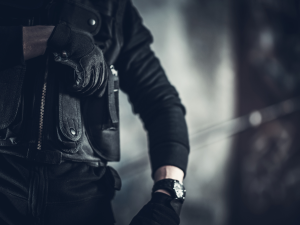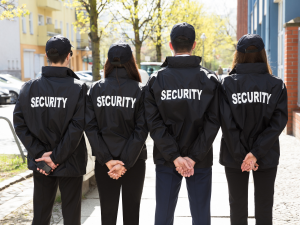Armed security guards, also known as armed security officers, are highly trained professionals entrusted with the responsibility of safeguarding people, property, and assets against potential threats and criminal activities.
Equipped with firearms and specialized training, armed guards play a crucial role in deterring crime, responding to emergencies, and maintaining peace and security in a variety of settings.
Join us as we explore the multifaceted world of armed security guards and delve into the challenges, responsibilities, and contributions of these dedicated professionals.
The Types of Armed Security Guards
Uniformed Security Officers:
These are the most common type of armed security guards. They are typically employed by security companies and are stationed at various locations, such as banks, malls, hospitals, or office buildings. Their primary responsibilities include patrolling the premises, monitoring surveillance cameras, and responding to security incidents.
Corporate Security Guards: Armed Security Guards
Armed guards employed by corporations to protect their assets, employees, and facilities fall into this category. They may work in office buildings, manufacturing plants, or research facilities, where they ensure the safety of employees, prevent theft, and enforce company policies.
Event Security Guards: Armed Security Guards
Events such as concerts, festivals, and sports games often require security guards to maintain order and ensure the safety of attendees. Event security guards are responsible for controlling access to the venue, monitoring crowds, and responding to any security threats or emergencies.
Executive Protection Agents: Armed Security Guards
Also known as bodyguards, executive protection agents are tasked with providing security to high-profile individuals, such as celebrities, politicians, or corporate executives. They are trained in close protection techniques and may accompany their clients everywhere to mitigate potential risks.
Government Security Officers: Armed Security Guards
Armed guards employed by government agencies, such as the police, military, or federal agencies, fulfill various security roles. They may work in areas such as border security, courthouse security, or diplomatic missions, where they protect government officials, facilities, and classified information.
Residential Security Guards: Armed Security Guards
Armed guards employed by residential communities, gated neighborhoods, or private estates fall into this category. They are responsible for ensuring the safety and security of residents, patrolling the premises, and monitoring access points to prevent unauthorized entry or criminal activity.
Understanding the Role and Responsibilities of Armed Security Guards

Deterrence and Prevention
Armed security guards serve as a visible deterrent to potential threats and criminal activities. Their mere presence often dissuades wrongdoers from engaging in unlawful behavior, thus preventing incidents before they occur. By maintaining a vigilant watch over their assigned areas, armed guards effectively deter theft, vandalism, trespassing, and other security breaches.
Patrol and Surveillance
A significant aspect of an armed security guard's duty is to conduct patrols and monitor surveillance equipment to identify any suspicious activities or security risks. Whether stationed at a commercial property, residential complex, or public event, armed guards are responsible for maintaining a high level of vigilance. Through regular patrols and thorough surveillance, they ensure that all areas under their watch remain secure and free from potential threats.
Emergency Response
Armed security guards are trained to respond swiftly and effectively to emergencies of various kinds, including medical crises, fires, and acts of violence. As first responders, they play a crucial role in mitigating risks and protecting lives in times of crisis. Their training equips them with the necessary skills to assess situations quickly, provide assistance to those in need, and coordinate with law enforcement or emergency services as required.
Enforcement of Regulations: Security Guards
In addition to deterring criminal activity, security guards enforce rules and regulations specific to their assigned locations. This may include ensuring compliance with access control measures, enforcing parking regulations, or enforcing policies related to alcohol consumption and trespassing. By maintaining order and adherence to established rules, armed guards contribute to the overall safety and security of the premises.
Protection of Assets
One of the primary responsibilities of armed security guards is to protect valuable assets, including property, merchandise, equipment, and sensitive information. Whether its safeguarding cash deposits at a financial institution or protecting high-value items at a retail store, armed guards play a vital role in preventing theft and unauthorized access. Through diligent monitoring and proactive measures, they help mitigate the risk of financial loss and damage to assets.
Risk Assessment and Mitigation
Armed guards are trained to assess potential security risks and develop strategies to mitigate them effectively. This involves identifying vulnerabilities within their assigned areas, implementing security protocols and measures to address them, and proactively addressing emerging threats. By staying informed about current security trends and evolving threats, armed guards can adapt their strategies to ensure maximum protection.

The Challenges Faced by Armed Security Guards
While security guards are often the first line of defence of your home and business, they are not immune to risks and challenges.
Physical Danger
Perhaps the most immediate and apparent challenge faced by security guards is the constant threat of physical danger. Whether patrolling a high-crime area or protecting a high-profile individual, armed guards put themselves at risk every day. They must remain vigilant at all times, prepared to respond swiftly and decisively to any potential threat. The presence of firearms adds an additional layer of complexity, as guards must be trained to handle their weapons safely and effectively in high-stress situations.
De-Escalation and Conflict Resolution
Armed security guards often find themselves in tense and potentially volatile situations where conflicts must de-escalate and resolved peacefully. This requires exceptional communication skills, emotional intelligence, and the ability to remain calm under pressure. Guards must be adept at diffusing potentially explosive situations without resorting to violence, relying instead on their training and de-escalation techniques to resolve conflicts peacefully.
Legal and Ethical Considerations
Armed security guards operate within a complex legal and ethical framework that governs their actions and responsibilities. They must navigate a myriad of laws and regulations governing the use of force, firearm handling, and privacy rights, among others. Furthermore Any deviation from these standards can have serious legal and professional consequences. As such, armed guards must be well-versed in the law and adhere strictly to ethical guidelines in their conduct.
Risk of Misuse of Force
The use of force is a critical aspect of an armed security guard's job, but it also carries the risk of misuse or abuse. Guards must strike a delicate balance between maintaining order and using force only when absolutely necessary. They must be train to assess threats accurately and respond proportionately, avoiding excessive or unwarranted force. Any misuse of force can not only jeopardize the safety of individuals but also tarnish the reputation of the security company and the profession as a whole.
Psychological Impact
The nature of the armed security guard profession can take a significant toll on mental health and well-being. Constant exposure to potentially traumatic events, such as violence, accidents, or emergencies, can lead to high levels of stress, anxiety, and even post-traumatic stress disorder (PTSD). Guards must be resilient and equipped with coping mechanisms to deal with the psychological challenges of their job. Adequate support and resources, including counseling and debriefing services, are essential to help guards cope with the emotional toll of their work.
Public Perception and Stereotypes
Armed security guards often face negative stereotypes and public scrutiny, with some viewing them as overly aggressive or trigger-happy. This can lead to mistrust and hostility towards armed guards, making it more difficult for them to perform their duties effectively. Guards must work to overcome these stereotypes by demonstrating professionalism, integrity, and a commitment to serving and protecting the community. Building positive relationships with the public and fostering trust and cooperation are essential for overcoming these challenges.
The Bottom Line: Armed Security Guards
Moreover, security guards are the protectors of our society. They work tirelessly keeping their lives and comfort on the stake to ensure the safety and security of people.
Their job is tough and involves lots of different tasks, like watching out for trouble, being ready to help in emergencies, and following strict rules. Even though their job can be challenging, armed guards stay dedicated to keeping us all safe. Finally, Let's remember to appreciate these brave individuals who work tirelessly to protect our communities and keep us out of harm's way.



